The Review of Austrian Economics Vol. 8, No. 2 (1995): 39-57
The Alleged Self-Evidence of Equality
 One of the great glories of mankind is that, in contrast to other species, each individual is unique, and hence irreplaceable; whatever the similarities and common attributes among men, it is their differences that lead us to honor, or celebrate, or deplore the qualities or actions of any particular person. [1] t is the diversity, the heterogeneity, of human beings that is one of the most striking attributes of mankind.
One of the great glories of mankind is that, in contrast to other species, each individual is unique, and hence irreplaceable; whatever the similarities and common attributes among men, it is their differences that lead us to honor, or celebrate, or deplore the qualities or actions of any particular person. [1] t is the diversity, the heterogeneity, of human beings that is one of the most striking attributes of mankind.
This fundamental heterogeneity makes all the more curious the pervasive modern ideal of “equality.” For “equality” means “sameness”—two entities are “equal” if and only if they are the same thing. X = y only if they are either identical, or they are two entities that are the same in some attribute. If x, y, and z are “equal in length,” it means that each one of them is identical in length, say 3 feet. People, then, can only be “equal” to the extent that they are identical in some attribute: thus, if Smith, Jones and Robinson are each 5 feet, 11 inches in height, then they are “equal” in height. But except for these special cases, people are heterogeneous, and diverse, that is, they are “unequal.” Diversity, and hence “inequality,” is therefore a fundamental fact of the human race. So how do we account for the almost universal contemporary worship at the shrine of “equality,” so much so that it has virtually blotted out other goals or principles of ethics? And taking the lead in this worship have been philosophers, academics, and other leaders and members of the intellectual elites, followed by the entire troop of opinion-molders in modern society, including pundits, journalists, ministers, public school teachers, counselors, human relations consultants and “therapists.” And yet, it should be almost evidently clear that a drive to pursue “equality” starkly violates the essential nature of mankind, and therefore can only be pursued, let alone attempt to succeed, by the use of extreme coercion.
The current veneration of equality is, indeed, a very recent notion in the history of human thought. Among philosophers or prominent thinkers the idea scarcely existed before the mid-eighteenth century; if mentioned, it was only as the object of horror or ridicule.[2] The profoundly anti-human and violently coercive nature of egalitarianism was made clear in the influential classical myth of Procrustes, who “forced passing travellers to lie down on a bed, and if they were too long for the bed he lopped off those parts of their bodies which protruded, while racking out the legs of the ones who were too short. This was why he was given the name of Procrustes [The Racker].”[3]
One of the rare modern philosophers critical of equality made the point that “we can ask whether one man is as tall as another, or we may, like Procrustes, seek to establish equality among all men in this respect.”[4] But our fundamental answer to the question whether equality exists in the real world must be clearly that it does not, and any quest “to establish equality” can only result in the grotesque consequences of any Procrustean effort. How, then, can we not regard Procrustes’s egalitarian “ideal” as anything but monstrous and unnatural? The next logical question is why Procrustes chooses to pursue such a clearly anti-human goal, and one that can only lead to catastrophic results?
In the context of the Greek myth, Procrustes is simply pursuing a lunatic “aesthetic” goal, presumably following his personal star of every person being precisely equal in height to the length of his bed. And yet, this sort of non-argument, this bland assumption that the ideal of equality needs no justification, is endemic among egalitarians. Thus, the argument of the distinguished Chicago economist Henry C. Simons for a progressive income tax was that he found inequality of income “distinctly evil or unlovely.”[5] Presumably, Procrustes might have used the same sort of “argument” in behalf of the “unlovely” nature of inequality of height had he bothered to write an essay advocating his particular egalitarian program. Indeed, most writers simply assume that equality is and must be the overriding goal of society, and that it scarcely needs any supporting argument at all, even a flimsy argument from personal esthetics. Robert Nisbet was and is still correct when he wrote, two decades ago, that
It is evident that . . . the idea of equality will be sovereign for the rest of this century in just about all circles concerned with the philosophical bases of public policy. … In the past, unifying ideas tended to be religious in substance. There are certainly signs that equality is taking on a sacred aspect among many minds today, that it is rapidly acquiring dogmatic status, at least among a great many philosophers and social scientists.[6]
The Oxford sociologist A. H. Halsey, indeed, was “unable to divine any reason other than ‘malevolence’ why anyone should want to stand” in the way of his egalitarian program. Presumably that “malevolence” could only be diabolic.[7]
“Equality” in What?
Let us now examine the egalitarian program more carefully: what, exactly, is supposed to be rendered equal? The older, or “classic,” answer was monetary incomes. Money incomes were supposed to be made equal.
On the surface, this seemed clear-cut, but grave difficulties arose quickly. Thus, should the equal income be per person, or per household? If wives don’t work, should the family income rise proportionately? Should children be forced to work in order to come under the “equal” rubric, and if so at what age? Furthermore, is not wealth as important as annual income? If A and B each earn $50,000 a year, but A possesses accumulated wealth of $1,000,000 and B owns virtually nothing, their equal incomes scarcely reflect an equality of financial position.[8] But if A is taxed more heavily due to his accumulation, isn’t this an extra penalty on thrift and savings? And how are these problems to be resolved?
But even setting aside the problem of wealth, and focussing on income, can incomes ever really be equalized? Surely, the item to be equalized cannot be simply monetary income. Money is, after all, only a paper ticket, a unit of account, so that the element to be equalized cannot be a mere abstract number but must be the goods and services that can be purchased with that money. The world-egalitarian (and surely the truly committed egalitarian can hardly stop at a national boundary) is concerned to equalize not currency totals but actual purchasing-power. Thus, if A receives an income of 10,000 drachmas a year and B earns 50,000 forints, the equalizer will have to figure out how many forints are actually equivalent to one drachma in purchasing power, before he can wield his equalizing axe correctly. In short, what the economist refers to as “real” and not mere monetary incomes must be equalized for all.
But once the egalitarian agrees to focus on real incomes, he is caught in a thicket of inescapable and insoluble problems. For a large number of goods and services are not homogeneous, and cannot be replicated for all. One of the goods that a Greek may consume with his drachmas is living in, or spending a great deal of time in, the Greek islands. This service (of continuously enjoying the Greek islands) is barred ineluctably to the Hungarian, to the American and to everyone else in the world. In the same way, dining regularly at an outdoor cafe on the Danube is an estimable service denied all the rest of us who do not live in Hungary.
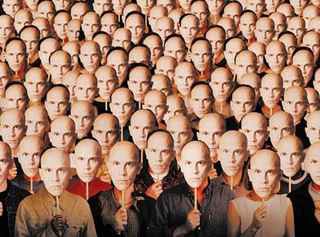
How, then, is real income to be equalized throughout the world? How can the enjoyment of the Greek islands or dining on the Danube be measured, much less gauged by the egalitarian against other services of location? If I am a Nebraskan, and exchange rate manipulations have allegedly equated my income with a Hungarian, how is living in Nebraska to be compared with living in Hungary? The bog gets worse on contemplation. If the egalitarian considers that Danube-enjoyment is somehow superior to enjoying the sights and scenes of Omaha, or a Nebraska farm, on exactly what basis is the egalitarian going to tax the Hungarian and subsidize everyone else? How is he to measure, in monetary terms, the “value of dining on the Danube?” Obviously, the stern rigors of natural law prevent him, much as he would clearly like to do so, from taking the Danube physically and parcelling it out equally to every inhabitant throughout the world. And what of people who prefer the views of and life in a Nebraska farm community to the sins of Budapest? Who, then, is to be taxed and who subsidized and by how much?
Perhaps in desperation, the egalitarian might fall back on the view that everyone’s location reflects his preferences, and that we can therefore simply assume that locations can be neglected in the great egalitarian re-ordering. But while it is true that virtually every spot on the globe is beloved by someone, it is also true that, by and large, some locations are greatly preferred to others. And the location problem occurs within as well as between countries. It is generally acknowledged, both by its residents and by envious outsiders, that the Bay Area of San Francisco is, by climate and topography, far closer to an earthly Paradise than, say West Virginia or Hoboken, New Jersey. Why then don’t these benighted outlanders move to the Bay Area? In the first place, many of them have, but others are barred by the fact of its relatively small size, which (among other, man-made restrictions, such as zoning laws), severely limits migration opportunities. So, in the name of egalitarianism, should we levy a special tax on Bay Area residents and on other designated garden spots, to reduce their psychic income of enjoyment, and then subsidize the rest of us? And how about pouring subsidies into specially designated Dismal Areas, again in the pursuit of equal real incomes? And how is the equalizing government supposed to find out how much people in general, and a fortiori each individual resident, love the Bay Area and how much negative income they suffer from living in, say, West Virginia or Hoboken? Obviously, we can’t ask the various residents how much they love or hate their residential areas, for the residents of every location from San Francisco to Hoboken, would have every incentive to lie—to rush to proclaim to the authorities how much they revile the place where they live.
And location is only one of the most obvious examples of non-homogeneous goods and services which cannot be possibly equalized across the nation or the world.
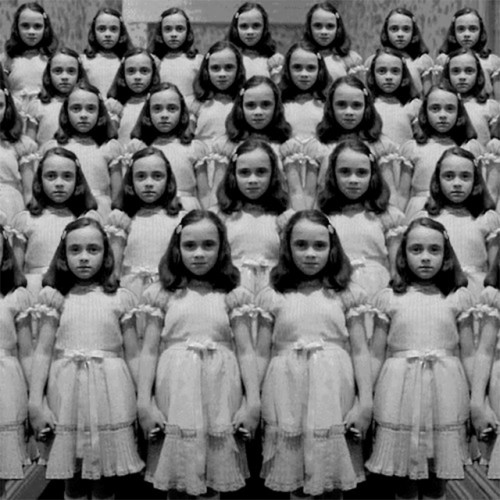
Moreover, even if wealth and real incomes are both equalized, how are people, their abilities, cultures, and traits, to be equalized? Even if the monetary position of each family is the same, will not children be born into families with very different natures, abilities, and qualities? Isn’t that, to use a notorious egalitarian term, “unfair”? How then can families be made equal, that is, uniform? Doesn’t a child in a cultured and intelligent and wise family enjoy an “unfair” advantage over a child in a broken, moronic, and “dysfunctional” home? The egalitarian must therefore press forward and advocate, as have many communist theorists, the nationalization of all kids from birth, and their rearing in legal and identical state nurseries. But even here the goal of equality and uniformity cannot be achieved. The pesky problem of location will remain, and a state nursery in the Bay Area, even if otherwise identical in every way with one in the wilds of central Pennsylvania, will still enjoy inestimable advantages—or, at the very least, ineradicable differences from the other nurseries. But apart from location, the people—the administrators, nurses, teachers, inside and outside of the various encampments—will all be different, thus giving each child an inescapably different experience, and wrecking the quest for equality for all.
Of course, suitable brainwashing, bureaucratization, and the general robotization and deadening of spirit in the state encampments may help reduce all the teachers and nurses, as well as the children, to a lower and more common denominator, but ineradicable differences and advantages will still remain.
And even if, for the sake of argument, we can assume general equality of income and wealth, other inequalities will not only remain, but, in a world of equal incomes, they will become still more glaring and more important in weighing people. Differences of position, differences of occupation, and inequalities in the job hierarchy and therefore in status and prestige will become even more important, since income and wealth will no longer be a gauge for judging or rating people. Differences in prestige between physicians and carpenters, or between top executives and laborers, will become still more accentuated. Of course, job prestige can be equalized by eliminating hierarchy altogether, abolishing all organizations, corporations, volunteer groups, etc. Everyone will then be equal in rank and decisionmaking power. Differences in prestige could only be eliminated by entering the Marxian heaven and abolishing all specialization and division of labor among occupations, so that everyone would do everything. But in that sort of economy, the human race would die out with remarkable speed.[9]
The New Coercive Elite
When we confront the egalitarian movement, we begin to find the first practical, if not logical, contradiction within the program itself: that its outstanding advocates are not in any sense in the ranks of the poor and oppressed, but are Harvard, Yale, and Oxford professors, as well as other leaders of the privileged social and power elite. What kind of “egalitarianism” is this? If this phenomenon is supposed to embody a massive assumption of liberal guilt, then it is curious that we see very few of this breast-beating elite actually divesting themselves of their worldly goods, prestige, and status, and go live humbly and anonymously among the poor and destitute. Quite the contrary, they seem not to stumble a step on their climb to wealth, fame, and power. Instead, they invariably bask in the congratulations of themselves and their like-minded colleagues of the high-minded morality in which they have all cloaked themselves.
Perhaps the answer to this puzzle lies in our old friend Procrustes. Since no two people are uniform or “equal” in any sense in nature, or in the outcomes of a voluntary society, to bring about and maintain such equality necessarily requires the permanent imposition of a power elite armed with devastating coercive power. For an egalitarian program clearly requires a powerful ruling elite to wield the formidable weapons of coercion and even terror required to operate the Procrustean rack: to try to force everyone into an egalitarian mold. Hence, at least for the ruling elite, there is no “equality” here—only vast inequalities of power, decisionmaking, and undoubtedly, income and wealth as well.
Thus, the English philosopher Antony Flew points out that “the Procrustean ideal has, as it is bound to have, the most powerful attraction for those already playing or hoping in the future to play prominent or rewarding parts in the machinery of enforcement.” Flew notes that this Procrustean ideal is “the uniting and justifying ideology of a rising class of policy advisors and public welfare professionals,” adding significantly that “these are all people both professionally involved in, and owing to their past and future advancement to, the business of enforcing it.”[10]
That the necessary consequence of an egalitarian program is the decidedly inegalitarian creation of a ruthless power elite was recognized and embraced by the English Marxist-Lenist sociologist Frank Parkin. Parkin concluded that “Egalitarianism seems to require a political system in which the state is able to hold in check those social and occupational groups which, by virtue of their skills or education or personal attributes, might otherwise attempt to stake claims to a disproportionate share of society’s rewards. The most effective way of holding such groups in check is by denying the right to organize politically, or, in other ways, to undermine social equality. This presumably is the reasoning underlying the Marxist-Leninist case for a political order based upon the dictatorship of the proletariat.”[11]
But how is it that Parkin and his egalitarian ilk never seem to realize that this explicit assault on “social equality” leads to tremendous inequalities of power, decisionmaking authority, and, inevitably, income and wealth? Indeed, why is this seemingly obvious question never so much as raised among them? Could there be hypocrisy or even deceit at work?
The Iron Law of Oligarchy
One reason that an egalitarian political program must lead to the installation of a new coercive political elite is that hierarchies and inequalities of decisionmaking are inevitable in any human organization that achieves any degree of success in attaining its goals.
Robert Michels first observed this Iron Law of Oligarchy, in seeing the Social Democratic parties of Europe in the late nineteenth century, officially committed to equality and abolition of the division of labor, in practice being run by a small ruling elite. And there is nothing, outside of egalitarian fantasies, wrong with this universal human fact, or law of nature. In any group or organization, there will arise a core leadership of those most able, energetic, and committed to the organization, I know, for example, of a small but increasingly successful volunteer, musical society in New York. Although there is a governing board elected annually by its members, the group has for years been governed by the benevolent but absolute autocratic rule of its president, a lady who is highly intelligent, innovative, and, though employed full-time elsewhere, able and willing to devote an incredible amount of time and energy to this organization. Several years ago some malcontent challenged this rule, but the challenge was easily beaten back, since every rational member knew full well that she was absolutely vital to the success of the organization.
Not only is there nothing wrong with this situation, but blessed be the group where such a person exists and can come to the fore! There is, in fact, everything right about a rise to power, in voluntary or market organizations, of the most able and efficient, of a “natural aristocracy,” in Jeffersonian terms. Democratic voting, at its best when shareholders of a corporation vote the aliquot share of their ownership of a company’s assets, is only secondarily useful as a method of displacing natural aristocrats or “monarchs” gone sour, or, in Aristotelian terms, who have deteriorated from “monarch” to “tyrants.” Democratic voting, therefore, is even at its best scarcely even a primary good, let alone a good-in-itself to be glorified or even deified.
During a period in the mid-1960s, the New Left, before it hived off into Stalinism and bizarre violence, was trying to put into effect a new political theory: participatory democracy. Participatory democracy sounded libertarian, since the idea was that majority rule, even in a private and voluntary organization, is “coercive,” and therefore that all decisions of that organization must be stripped of oligarchic rule. Every member would then participate equally, and furthermore, every member would have to give his or her consent to any decision. In a sense, this Unanimity Rule foreshadowed and paralleled the Unanimity Rule of James Buchanan and of Paretian “welfare economics.”
A friend of mine was teaching about the history of Vietnam at the New Leftist Free University of New York, originally a scholarly organization founded by a young sociologist couple. The Free University set out to govern itself on participatory democratic principles. The governing body, the board of the Free University, therefore consisted of the “staff”—the sociologist couple—plus any students (who paid a modest tuition) or teachers (unpaid) who cared to attend the board’s meetings. All were equal, the founding staff was no more powerful than any teacher or wandering student. All decisions of the school, from courses taught, room assignments, and on down to whether or not the school needed a paint job and what color the paint should be, were decided by the board, never by voting but always by unanimous consent.
Here was a fascinating sociological experiment. Not only, as one might expect, were very few decisions of any sort reached, but the “board meeting” stretched on endlessly, so that the board meeting expanded to become life itself—a kind of Sartrian No Exit situation. When my friend left the perpetual meeting each day at 5:00 pm to go home, he was accused of abandoning the meeting and thereby “betraying the collective” and the school by attempting to live some sort of private life outside the meeting. Perhaps this is what the current leftist political theorists who exalt the “public life” and “civic virtue” have in mind: private lives being forsaken on behalf of the permanent floating “civically virtuous” collective meeting of “the community!”
It should not come as any surprise to reveal that the Free University of New York did not last very long. In point of fact, it quickly deteriorated from a scholarly outfit to the “teaching” of New Left astrology, tarot cards, channeling, eurythmics, and whatnot as the scholars all fled before the mass man, or as a sociological Gresham’s Law came into action. (As for the founding couple, the female wound up in jail for unsuccessfully trying to blow up a bank, while the male, getting increasingly glassy-eyed, in a feat of sociological legerdemain, talked himself into the notion that the only moral occupation for a revolutionary sociologist was that of radio repairman.)
New Left educational theory, during that period, also permeated more orthodox colleges throughout the country. In those days, the doctrine was not so much that teaching had to be “politically correct,” but that the normal teacher-student relation was evil because inherently unequal and hierarchical. Since the teacher is assumed to know more than the student, therefore, the truly egalitarian and “democratic” form of education, the way to put teacher and student on an equal footing, is to scrap course content altogether and to sit around discussing the student’s “feelings.” Not only are all feelings in some sense equal, at least in the sense that one person’s feelings cannot be considered “superior” to others, but those feelings are supposedly the only subjects “relevant” to students. One problem that this doctrine raised, of course, is why the students, or more correctly their long-suffering parents, should pay faculty who are qualified in knowledge of economics, sociology, or whatever but not in psychotherapy, to sit around gabbing about the students’ feelings?
Institutionalizing Envy
As I have elaborated elsewhere, the egalitarian impulse, once granted legitimacy, cannot be appeased. If monetary or real incomes become equalized, or even if decisionmaking power should be equalized, other differences among persons become magnified and irritating to the egalitarian: inequalities in looks, intelligence, and so on.[12] One intriguing point however: there are some inequalities that never seem to outrage egalitarians, namely income inequalities among those who directly supply consumer services—notably athletes, movie and TV entertainers, artists, novelists, playwrights, and rock musicians. Perhaps this is the reason for the persuasive power of Robert Nozick’s famous “Wilt Chamberlain” example in defense of market-determined incomes. There are two possible explanations: (1) that these consumer values are held by the egalitarians themselves and are therefore considered legitimate, or (2) that, with the exception of athletics, these are fields implicitly recognized as dominated nowadays by forms of entertainment and art that require no real talent. Differences in income, therefore, are equivalent to winning at a lottery, and lottery or sweepstake winners are universally lauded as purely “lucky,” with no envy of superior attributes to be attached to them.[13]
The German sociologist Helmut Schoeck has pointed out that modern egalitarianism is essentially an institutionalization of envy. In contrast to successful or functional societies, where envy is always considered a shameful emotion, egalitarianism sets up a pervasive attitude that the exciting of envy by manifesting some form of superiority is considered the greatest evil. Or, as Schoeck put it, “the highest value is envy-avoidance.”[14] Indeed, communist anarchists explicitly aim to stamp out private property because they believe that property gives rise to inequality, and therefore to feelings of envy, and hence “causes” crimes of violence against those with more property. But as Schoeck points out, economic egalitarianism would then not be sufficient: and compulsory uniformity of looks, intelligence, etc. would have to follow.[15]
But even if all possible inequalities and difference among individuals could somehow be eradicated, Helmut Schoeck adds, there still would remain an irreducible element: the mere existence of individual privacy. As Schoeck puts it, “if a man really makes use of his right to be alone, the annoyance, envy, and mistrust of his fellow citizens will be aroused. . . . Anyone who cuts himself off, who draws his curtains and spends any length of time outside the range of observation, is always seen as a potential heretic, a snob, a conspirator.”[16] After some amusing comments about suspicion of the “sin of privacy” in American culture, particularly in the widespread open-door policy among academics, Schoeck turns to the Israeli kibbutz and to its widely and overly revered philosopher, Martin Buber. Buber maintained that to constitute a “real community,” the absolutely equal members of the kibbutz must “have mutual access to one another and [be] ready for one another.” As Schoeck interprets Buber: “a community of equals, where no one ought to envy anyone else, is not guaranteed by absence of possessions alone, but requires mutual possession, in purely human terms. … Everyone must always have time for everybody else, and anyone who hoards his time, his leisure hours, and his privacy excludes himself.”[17]
The New Group Egalitarianism
So far we have been describing what may be called “classical,” or the Old, egalitarianism, aimed to make all individuals in some sense equal, generally in income and wealth. But in recent years, we have all been subjected to a burgeoning and accelerating New Egalitarianism, which stresses not that every individual must be made equal, but that the income, prestige, and status of a seemingly endless proliferation of “groups” must be made equal to each other.
At first blush, it might seem that the new group egalitarianism is less extreme or unrealistic than the old individual creed. For if every individual is really totally equal to every other in income, wealth, or status, then it will follow logically that any subset of groups of such individuals will be equal as well. Shifting emphasis from individual to group egalitarianism must therefore imply settling for a less severe degree of equality. But this conclusion misconceives the whole point of egalitarianism, old or new. No egalitarian actually expects ever to be in a state of absolute equality, still less does he begin his analysis with that starting point.
Perhaps we can illuminate the true nature of the egalitarian drive, and the relationship between the Old and the New movements, by focussing not, as is usually done, on their patently absurd and self-contradictory ostensible goals of equality, but on the required means to attain such goals: namely the coming to power of the Procrustean State apparatus, the new coercive elite. Who are the Procrustean elite? That is, which groups are needed to constitute such an elite? By an odd coincidence, the makeup of such groups seems to correspond, almost one-to-one, to those people who have been most enthusiastic about egalitarianism over the years: intellectuals, academics, opinion-molders, journalists, writers, media elites, social workers, bureaucrats, counsellors, psychologists, personnel consultants, and especially for the ever-accelerating new group egalitarianism, a veritable army of “therapists” and sensitivity trainers. Plus, of course, ideologues and researchers to dream up and discover new groups that need egalitarianizing.
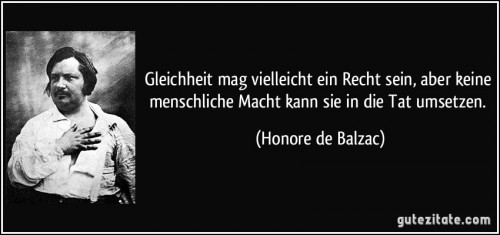
If these groups of what might very loosely be called the “intelligentsia” are the driving force of the Old and the New embodiments of egalitarianism, how does this minority hope to convince a majority of the public to turn over an apparatus of despotic power into its hands? In the first place, the intellectuals start with a huge advantage far beyond their relative smallness of number: they are dominant within the “opinion-molding class” that attempts to shape public opinion, and often succeeds in that task. As is always the case, the State rulers need the support of an opinion-molding class to engineer the consent of the public. In the Old Egalitarianism, the would-be rulers sought to bring into their camp, in the first place, the seeming economic beneficiaries of the egalitarian program—the lower-income groups who would be recipients of much of the transfer, or soaking of the wealthy (part of the transfer from the rich, of course, would go into the coffers of the Procrustean elites themselves, the brokers of the egalitarian wealth-transfer). As for the plundered wealthy, they would be induced to support the system by being persuaded that they must expiate their “guilt” at being wealthier than their impoverished fellow-citizens. Infusion of guilt is a classic path of persuading the wealthy victim to surrender his wealth without a struggle.
Any success in the Old Egalitarian program led, of course, to expansion of the number, the wealth, and the power of the new Procrustean elite, resulting in an ever lower income definition of “the wealthy” to be plundered, and an ever higher definition of “the poor” to be subsidized. This process has been all too clearly at work in the United States and in the western world in the twentieth century. From being confined to the highest income brackets, for example, the payers of income tax have descended into the ranks of the far more numerous middle class. At the same time, the “poverty level” to be subsidized and cosseted has marched steadily upward, as the “poverty line” is continually revised upward, and the subsidized escalate from the very poor to the unemployed to the more affluent “working poor.”
From the point of view of the egalitarians, however, the weakness of the Old Egalitarianism is that it has only one category of beneficiary—“the poor,” however defined, and one category of the plundered, “the rich.” (That they themselves are notable beneficiaries is always discreetly left hidden behind the veil of altruism and alleged expertise. For anyone else to bring up to the point would be considered ungentlemanly, or, even worse, to be engaging in the much-derided “conspiracy theory of history.”)[18]
In the light of this analysis, then, let us examine the New Group Egalitarianism. As we all know, the new egalitarians search for “oppressed” groups who are lower in income, status, or prestigious jobs than others, who become the designated “oppressors.” In classic leftism or Marxism, there was only one alleged “oppressed group,” the proletariat. Then the floodgates were opened, and the ranks of the designated oppressed, or “accredited victims,” have proliferated seemingly without end. It began with the oppressed blacks, and then in rapid succession, there were woman, Hispanics, American Indians, immigrants, “the disabled,” the young, the old, the short, the very tall, the fat, the deaf, and so on ad infinitum. The point is that the proliferation is, in fact, endless. Every individual “belongs” to an almost infinite variety of groups or classes. Take, for example, a Mr. John Smith. He may belong to an enormous number of classes: e.g., people named “Smith,” people named “John,” people of height 5 feet 10 inches, people of height under 6 feet, people who live in Battle Creek, Michigan, people who live north of the Mason-Dixon line, people with an income of … etc. And among all these classes, there are an almost infinite number of permutations. It has gotten to the point where the only “theory” of “oppression” needed is if any such group has a lower income or wealth or status than other groups. The below-average group, whatever it is, is then by definition, “discriminated against” and therefore is designated as oppressed. Whereas any group above the average is, by definition, doing the discriminating, and hence a designated oppressor.
Every new discovery of an oppressed group can bring the egalitarian more supporters in his drive to power, and also creates more “oppressors” to be made to feel guilty. All that is needed to find ever-new sources of oppressors and oppressed is data and computers, and, of course, researchers into the phenomena—the researchers themselves constituting happy members of the Procrustean elite class.[19]
The charm of group egalitarianism for the intellectual-technocratic-therapeutic-bureaucratic class, then, is that it provides a nearly endless and accelerating supply of oppressed groups to coalesce around the egalitarians’ political efforts. There are, then, far more potential supporters to rally around the cause than could be found if only “the poor” were being exhorted to seek and promote their “rights.” And as the cause expands, of course, there is a multiplication of jobs and an acceleration of taxpayer funding flowing into the coffers of the Procrustean ruling elite, a not-accidental feature of the egalitarian drive. Joseph Sobran recently wrote that, in the current lexicon, “need” is the desire of people to loot the wealth of others; “greed” is the desire of those others to keep the money they have earned; and “compassion” is the function of those who negotiate the transfer. The ruling elite may be considered the “professional compassionate” class. It is easy, of course, to be conspicuously “compassionate” if others are being forced to pay the cost.
This acceleration of New Egalitarianism leads, relatively quickly, to inherent problems. First, there is what Mises called “the exhaustion of the reserve fund,” that is, the resources available to be plundered and to pay for all this. As a corollary, along with this exhaustion may come the “backlash,” when the genuinely oppressed—the looted, those whom William Graham Sumner once called the Forgotten Man—may get fed up, rise up and throw off the shackles which have bound this Gulliver and induced him to shoulder the expanding parasitic burdens.
The New Egalitarian Elite
We conclude with one of the great paradoxes of our time: that the powerful and generally unchallenged cry for “equality” is driven by the decidedly inegalitarian aim of climbing on its back to increasingly absolute political power, a triumph which will of course make the egalitarians themselves a ruling elite in income and wealth as well as power. Behind the honeyed but patently absurd pleas for equality is a ruthless drive for placing themselves at the top of a new hierarchy of power. The new intellectual and therapeutic elite impose their rule in the name of “equality.” As Antony Flew tellingly puts it: equality “serves as the unifying and justifying ideology of certain social groups . . . the Procrustean ideal has, as it is bound to have, the most powerful attraction for those already playing or hoping in the future to play prominent or rewarding parts for the machinery of its enforcement.”[20]
In a brilliant and mordant critique of the current ascendancy of left-liberal intellectuals, the great economist and sociologist Joseph Schumpeter, writing as early as World War II, pointed out that nineteenth-century free-market “bourgeois” capitalism, in sweeping away aristocratic and feudal political structures, and challenging the “irrational” role of religion and the heroic virtues in behalf of the utilitarianism of the counting-house, foolishly managed to destroy the necessary protections for their own freemarket order. As Schumpeter vividly puts it: “The stock exchange is a poor substitute for the Holy Grail.” Schumpeter continues:
Capitalist rationality does not do away with sub- or super-rational impulses. It merely makes them get out of hand by removing the restraint of sacred or semi-sacred tradition. In a civilization that lacks the means and even the will to guide them, they will revolt…. Just as the call for utilitarian credentials has never been addressed to kings, lords, and popes in a judicial frame of mind that would accept the possibility of a satisfactory answer, so capitalism stands its trial before judges who have the sentence of death in their pockets. They are going to pass it, whatever the defense they may hear; the only success victorious defense can possibly produce is a change in the indictment.
The capitalist process, Schumpeter adds, “tends to wear away protective strata, to break down its own defenses, to disperse the garrisons of its entrenchments.” Moreover,
capitalism creates a critical frame of mind which, after having destroyed the moral authority of so many other institutions, in the end turns against its own; the bourgeois finds to his amazement that the rationalist attitude does not stop at the credentials of kings and popes but goes on to attack private property and the whole scheme of bourgeois values.
As a result, Schumpeter points out, “the bourgeois fortress becomes politically defenseless.” But,
defenseless fortresses invite aggression especially if there is rich booty in them…. No doubt it is possible, for a time, to buy them off. But this resource fails as soon as they discover that they can have all.
Schumpeter notes that his explanation for rising hostility to free market capitalism at a time when it had brought to the world unprecedented freedom and prosperity, is confirmed by the striking fact that,
there was very little hostility [to free-market capitalism] on principle as long as the bourgeois position was safe, although there was then much more reason for it; it [the hostility] spread pari passu with the crumbling of the protective walls.[21]
At the head and the nerve center of the driving force to take advantage of this bourgeois weakness have been the left-liberal intellectuals, a class multiplied vastly in number by the prosperity of capitalism and particularly by continuing and vast government subsidies to public schools, to formal literacy, and to modern communications. These subsidies not only helped create a huge class of intellectuals, but also have provided them—as well as the state apparatus—for the first time in history with the tools necessary to indoctrinate the mass of the public at large.[22] Moreover, since the bourgeois free-market order is deeply committed to the rights of private property, and hence to freedom of speech and the press, by the very principles at the heart of their system, they find it impossible to “discipline” the intellectuals, in Schumpeter’s phrase “to bring the intellectuals to heel.” Thus, the intellectuals, nurtured in the bosom of free-market capitalist society, take the earliest opportunity to turn savagely on their benefactors, “to nibble at the foundations of capitalist society,” and finally to organize a drive for power using their virtual monopoly of the opinion-molding process by perverting the original meaning of such words as “freedom,” “rights,” and “equality.”[23] Perhaps the most hopeful aspect of this process is that, as the late sociologist Christopher Lasch points out in his new work, the values, attitudes, principles and programs of the increasingly arrogant liberal intellectual elite is so out of sync, so much in conflict, with those of the mass of the American public, that a powerful counter-revolutionary backlash is apt to occur, and indeed at this very moment seems in the process of spreading rapidly throughout the country.[24]
In his sparkling essay, “Equality as a Political Weapon,” Samuel Francis gently chides conservative opponents of egalitarianism for expending a large amount of energy in philosophical, historical, and anthropological critiques of the concept and the doctrine of equality. This entire “formal critique,” however rewarding and illuminating, declares Francis, is really wide of the mark:
In a sense, I believe that it has been beating a dead horse—or more strictly, a dead unicorn, a beast that exists only in legend. The flaw, I believe, is that the formal doctrine of equality is itself nonexistent or at least unimportant.[25]
How so? The doctrine of equality is “unimportant,” Francis explains, “because no one, save perhaps Pol Pot or Ben Wattenberg, really believes in it, and no one, least of all those who profess it most loudly, is seriously motivated by it.” Here Francis quotes the great Pareto:
a sentiment of equality … is related to the direct interests of individuals who are bent in escaping certain inequalities not in their favor, and setting up new inequalities that will be in their favor, the latter being their chief concern.[26]
Francis then points out that “the real meaning” of the “doctrine of equality,” as well as its “real power as a social and ideological force,” cannot be countered by merely formal critiques. For:
the real meaning of the doctrine of equality is that it serves as a political weapon, to be unsheathed whenever it is useful for cutting down barriers, human or institutional, to the power of those groups that wear it on their belts.[27]
To mount an effective response to the reigning egalitarianism of our age, therefore, it is necessary but scarcely sufficient to demonstrate the absurdity, the anti-scientific nature, the self-contradictory nature, of the egalitarian doctrine, as well as the disastrous consequences of the egalitarian program. All this is well and good. But it misses the essential nature of, as well as the most effective rebuttal to, the egalitarian program: to expose it as a mask for the drive to power of the now ruling left-liberal intellectual and media elites. Since these elites are also the hitherto unchallenged opinion-molding class in society, their rule cannot be dislodged until the oppressed public, instinctively but inchoately opposed to these elites, are shown the true nature of the increasingly hated forces who are ruling over them. To use the phrases of the New Left of the late 1960s, the ruling elite must be “demystified,” “delegitimated,” and “desanctified.” Nothing can advance their desanctification more than the public realization of the true nature of their egalitarian slogans.
Notes
[1] I realize that specialists on bees or ants will point out divisions of labor among various groups of their species, but I remain unconvinced that any individual ant or bee has a “personality” worthy of being honored, mourned, or denounced.
[2] Thus, the great late-eleventh-century Arab al-Ghazali denounced the idea of coerced equality and sternly warned that any sharing of wealth must be voluntary. See S. M. Ghazafar and A. A. Islahi, “The Economic Thought of an Arab Scholastic: Abu Hamid al-Ghazali (1058-1111),” History of Political Economy 22 (Summer 1990): 381-403.
[3] Antony Flew, The Politics of Procrustes: Contradictions of Enforced Equality (Buffalo, N.Y.: Prometheus Books, 1981), frontispiece.
[4] J. R. Lucas, “Against Equality Again,” Philosophy 52 (July 1977): 255.
[5] Henry C. Simons, Personal Income Taxation (Chicago: University of Chicago Press, 1938), p. 19.
[6] Richard Nisbet, “The Pursuit of Equality,” The Public Interest 35 (1974): 103, cited in Antony Flew, Politics of Procrustes, p. 20.
[7] Cited in ibid., pp. 22, 187.
[8] The progressive income tax, a favorite device of egalitarians to help equalize incomes, neglects the wealth differential. As a result it is scarcely outlandish for multi-millionaires with relatively low annual incomes to support a progressive tax that would cripple rising young, high-income but low wealth, competitors. Cf. Ludwig von Mises, Human Action, 3rd rev. ed. (Chicago: Henry Regnery, 1966), p. 809.
[9] On the Marxian ideal of abolishing the division of labor, see Murray N. Rothbard, Freedom, Inequality, Primitivism, and the Division of Labor (Menlo Park, Calif.: Institute for Humane Studies, 1971), pp. 10-15 (reprinted 1991 by the Ludwig von Mises Institute); and Paul Craig Roberts, Alienation and the Soviet Economy, 2nd ed (New York: Holmes and Meier, 1990).
[10] Flew, Politics of Procrustes, pp. 11-12, 62.
[11] Frank Parkin, Class Inequality and Political Order (London: Paladin, 1972), p. 183; quoted in Flew, Politics of Procrustes, pp. 63-64.
[12] Murray N. Rothbard, Freedom, Inequality, Primitivism, and the Division of Labor, 2nd ed. (1971; Auburn, Ala.: Ludwig von Mises Institute, 1991); and Rothbard, “Egalitarianism as a Revolt Against Nature,” in Egalitarianism as a Revolt Against Nature and Other Essays (Washington, D.C.: Libertarian Review Press, 1974), pp. 1-13.
[13] Helmut Schoeck refers to the “absolute equality of opportunity that prevails in a game of chance which, as all the players know from the start, can be won only by a very few.” Schoeck points out that “the winner of a jackpot is very little envied. This is because of the real equality of opportunity and that absolute fortuitousness of the method of selecting the winner. A wife will not nag her husband for not having bought the right lottery ticket … no one could seriously suffer from an inferiority complex as a result of repeated failure.” Helmut Schoeck, Envy: A Theory of Social Behavior (New York: Harcourt, Brace and World, 1970), p. 240
[14] Ibid., p. 151.
[15] For penetrating examples of this egalitarian dystopia in fiction, see L. P. Hartley, Facial Justice (London: Humish Hamilton, 1960) and Kurt Vonnegut, Jr., “Harrison Bergeron” (1961), in Welcome to the Monkey House (New York: Dell, 1970), pp. 7-13.
[16] Schoeck, Envy, p. 295.
[17] Martin Buber, Paths in Utopia (Boston: Beacon Press, 1958), pp. 144ff; Schoeck, Envy, pp. 298-99.
[18] It seems to me that what is needed to perceive these relationships is no high-flown “theory,” but only a willingness to part the curtains of obfuscation and see what is actually going on, and to acknowledge that the Emperor has no clothes.
[19] On the new group egalitarianism, see Rothbard, Freedom, Inequality, and Primitivism, and the Division of Labor, pp. 8-15.
[20] Flew, Politics of Procrustes, pp. 11-12.
[21] Joseph A. Schumpeter, Capitalism, Socialism, and Democracy (New York: Harper & Bros., 1942), pp. 137, 143-44.
[22] For an illuminating discussion of the use of such subsidies and technology by the political and media elites to manipulate mass support, see Benjamin Ginsberg, The Captive Public: How Mass Opinion Promotes State Power (New York: Basic Books, 1986), pp. 86-98.
[23] Schumpeter, Capitalism, p. 150.
[24] See Christopher Lasch, ‘The Revolt of the Elites,” Harper’s 289 (November 1994): 39-49.
[25] Samuel Francis, “Equality as a Political Weapon,” Essays in Political Economy 10 (July 1991): 2. The essay was originally delivered as a lecture at the Ludwig von Mises Institute’s conference on “Equality and the Free Society” in April 1991. Also published in Beautiful Losers: Essays on the Failure of American Conservatism (Columbia, Mo.: University of Missouri Press, 1993).
[26] Samuel Francis, Beautiful Losers: Essays on the Failure of American Conservatism, pp. 208-9. The Pareto quote comes from Pareto’s The Mind and Society (New York: Harcourt, Brace, 1935), vol. 2, pp. 735-36.
[27] Francis, Beautiful Losers, p. 209.




 del.icio.us
del.icio.us
 Digg
Digg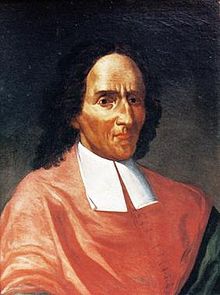 To download the mp3, right-click
To download the mp3, right-click 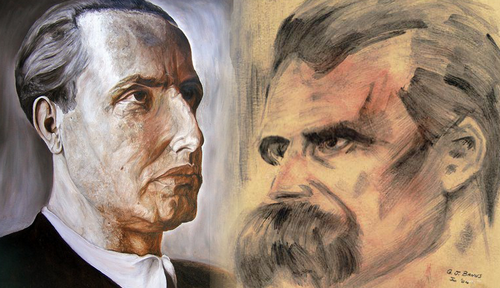

 La seconde représentation est celle d’Emile Combes, du parti radical, chef du gouvernement entre 1902 et le début de 1905, auteur d’un projet de loi de séparation déposé à l’automne 1904. Combes relie la liberté de conscience et le gallicanisme, cette doctrine traditionnelle des rois de France depuis le XIVe siècle qui fait du pouvoir politique le chef « temporel » de l’Église. De plus, depuis Louis XIV et Bossuet, le gallicanisme prétend représenter une manière éclairée d’être catholique. Combes veut contrôler la religion et supprimer les congrégations religieuses qui sont liées directement au pape. Elles représentent, selon lui, une manière particulièrement obscurantiste d’être chrétien qui ne relève pas de la liberté de conscience. Pour lui, l’État rend service à la religion en l’épurant. Dans la tradition gallicane de recherche d’un catholicisme français éclairé, la séparation est avant tout, alors, la séparation du catholicisme en France et de la papauté romaine. Les religions gardent, en effet, des liens de subordination avec l’État. Il s’agit d’une laïcité autoritaire, comportant des éléments de ce que Jean-Jacques Rousseau appelle, dans son livre Le contrat social, la « religion civile », ensemble de valeurs devant organiquement unir les citoyens d’un pays. Combes cite d’ailleurs ce passage concernant la religion civile quand la princesse Jeanne Bibesco, prieure du carmel d’Alger, dont il est amoureux, lui demande quel est le cœur de ses convictions.
La seconde représentation est celle d’Emile Combes, du parti radical, chef du gouvernement entre 1902 et le début de 1905, auteur d’un projet de loi de séparation déposé à l’automne 1904. Combes relie la liberté de conscience et le gallicanisme, cette doctrine traditionnelle des rois de France depuis le XIVe siècle qui fait du pouvoir politique le chef « temporel » de l’Église. De plus, depuis Louis XIV et Bossuet, le gallicanisme prétend représenter une manière éclairée d’être catholique. Combes veut contrôler la religion et supprimer les congrégations religieuses qui sont liées directement au pape. Elles représentent, selon lui, une manière particulièrement obscurantiste d’être chrétien qui ne relève pas de la liberté de conscience. Pour lui, l’État rend service à la religion en l’épurant. Dans la tradition gallicane de recherche d’un catholicisme français éclairé, la séparation est avant tout, alors, la séparation du catholicisme en France et de la papauté romaine. Les religions gardent, en effet, des liens de subordination avec l’État. Il s’agit d’une laïcité autoritaire, comportant des éléments de ce que Jean-Jacques Rousseau appelle, dans son livre Le contrat social, la « religion civile », ensemble de valeurs devant organiquement unir les citoyens d’un pays. Combes cite d’ailleurs ce passage concernant la religion civile quand la princesse Jeanne Bibesco, prieure du carmel d’Alger, dont il est amoureux, lui demande quel est le cœur de ses convictions. Juridiquement donc, cette quatrième représentation l’a largement emporté, dans le long terme, et elle fonctionne toujours aujourd’hui constituant, avec la troisième représentation, une laïcité silencieuse, celle qui contribue au calme et donc qui ne fait pas « l’actualité ». Cependant, les quatre types de laïcité continuent d’être en tension et d’exercer un impact politique et social, plus ou moins important suivant les situations et les religions en cause. Et, aujourd’hui, fonctionnent également deux autres modèles qui ne relèvent que peu, ou même pas du tout, de la loi de 1905, et qui font pourtant partie des représentations laïques actuelles existant en France.
Juridiquement donc, cette quatrième représentation l’a largement emporté, dans le long terme, et elle fonctionne toujours aujourd’hui constituant, avec la troisième représentation, une laïcité silencieuse, celle qui contribue au calme et donc qui ne fait pas « l’actualité ». Cependant, les quatre types de laïcité continuent d’être en tension et d’exercer un impact politique et social, plus ou moins important suivant les situations et les religions en cause. Et, aujourd’hui, fonctionnent également deux autres modèles qui ne relèvent que peu, ou même pas du tout, de la loi de 1905, et qui font pourtant partie des représentations laïques actuelles existant en France.

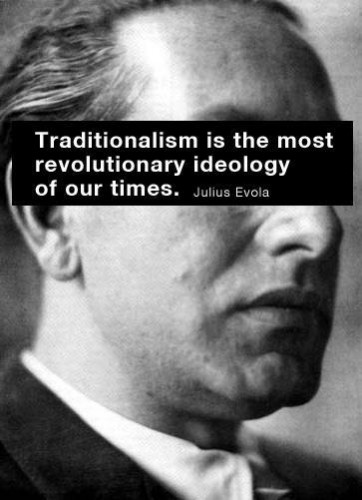 Now, moving from the Nietzschean perspective, which of course relates to the great German thinker at the end of the 19th century and his active and quasi-existential and volitional view of man, is the idea of foundational religiosity or primary religious and spiritual purpose. In high philosophy, there are views which dominate everyone around us and modern media and everyone who goes to a tertiary educational college, such as a university, in the Western world. These are modern ideas, which are materialistic and anti-spiritual and aspiritual and anti-religious or antagonistic to prior religious belief so much so that it’s taken as a given that those are the views that one holds. All of the views that convulsed the Western intelligentsia since the Second European Civil War which ended in 1945, ideas like existentialism and behaviorism and structuralism and so on, are all atheistic and material views. They’ve been discussed in other meetings. As one goes back slightly, one has various currents of opinion such as Marxism and Freudianism and behaviorism beginning in the late 19th century and convulsing much of the 20th century.
Now, moving from the Nietzschean perspective, which of course relates to the great German thinker at the end of the 19th century and his active and quasi-existential and volitional view of man, is the idea of foundational religiosity or primary religious and spiritual purpose. In high philosophy, there are views which dominate everyone around us and modern media and everyone who goes to a tertiary educational college, such as a university, in the Western world. These are modern ideas, which are materialistic and anti-spiritual and aspiritual and anti-religious or antagonistic to prior religious belief so much so that it’s taken as a given that those are the views that one holds. All of the views that convulsed the Western intelligentsia since the Second European Civil War which ended in 1945, ideas like existentialism and behaviorism and structuralism and so on, are all atheistic and material views. They’ve been discussed in other meetings. As one goes back slightly, one has various currents of opinion such as Marxism and Freudianism and behaviorism beginning in the late 19th century and convulsing much of the 20th century.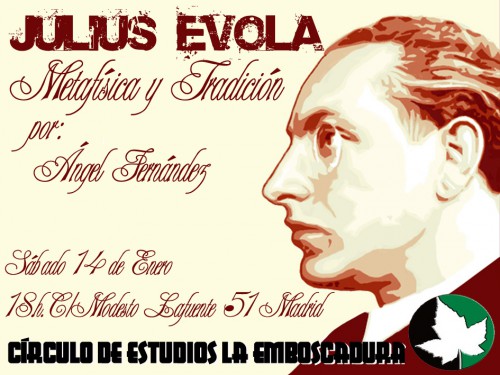
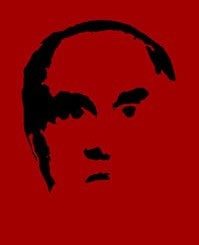 I remember Robin Cook, who was a minister who opposed the Iraq War and so on and died on a Scottish mountain, all that obsessive walking when one’s thin and redheaded can lead to undue coronaries, but Cook once said, and he’s a son of the manse like most of these Scottish politicians are, in other words, he comes from a Calvinist background to a degree, he said that in his early life he thought with the general Marxist and Freudian conundrum that religion was over. And now towards the end of his life, this is just before he died, he said, “the dark, clammy, icy hand of religiosity,” in all sorts of systems, “is rising again, and secular Leftists like us,” he’s speaking of himself and those who believe in his viewpoint, “are feeling the winds of this force coming from the side and from behind.” It’s a force that they don’t like.
I remember Robin Cook, who was a minister who opposed the Iraq War and so on and died on a Scottish mountain, all that obsessive walking when one’s thin and redheaded can lead to undue coronaries, but Cook once said, and he’s a son of the manse like most of these Scottish politicians are, in other words, he comes from a Calvinist background to a degree, he said that in his early life he thought with the general Marxist and Freudian conundrum that religion was over. And now towards the end of his life, this is just before he died, he said, “the dark, clammy, icy hand of religiosity,” in all sorts of systems, “is rising again, and secular Leftists like us,” he’s speaking of himself and those who believe in his viewpoint, “are feeling the winds of this force coming from the side and from behind.” It’s a force that they don’t like. It’s also inevitable that when Evola’s books were published they would enter the English-speaking world via the occult, via mysticism, via various types of initiated and individualistic religiosity. The whole point about the Western occult, whether one believes in the literal formulation that these people spout or whether one believes in it metaphorically and quasi-subjectively, is that it’s an individualistic form of religiosity. In simple terms, mass religion involves a small clerisy or priesthood in the old Catholic sense up there and the laity are down there and it’s in Medieval Latin, it’s slightly mysterious, you partly understand it if you’re grammar school educated, otherwise you don’t, it’s mysterious and semi-initiated, but you don’t really know, the mystery is part of the wonder of the thing, you look up at them and they’ve got their backs to you, and they’re looking up further beyond them towards the divine as they perceive it. Now, that’s a traditional form of mass religiosity, if you like.
It’s also inevitable that when Evola’s books were published they would enter the English-speaking world via the occult, via mysticism, via various types of initiated and individualistic religiosity. The whole point about the Western occult, whether one believes in the literal formulation that these people spout or whether one believes in it metaphorically and quasi-subjectively, is that it’s an individualistic form of religiosity. In simple terms, mass religion involves a small clerisy or priesthood in the old Catholic sense up there and the laity are down there and it’s in Medieval Latin, it’s slightly mysterious, you partly understand it if you’re grammar school educated, otherwise you don’t, it’s mysterious and semi-initiated, but you don’t really know, the mystery is part of the wonder of the thing, you look up at them and they’ve got their backs to you, and they’re looking up further beyond them towards the divine as they perceive it. Now, that’s a traditional form of mass religiosity, if you like.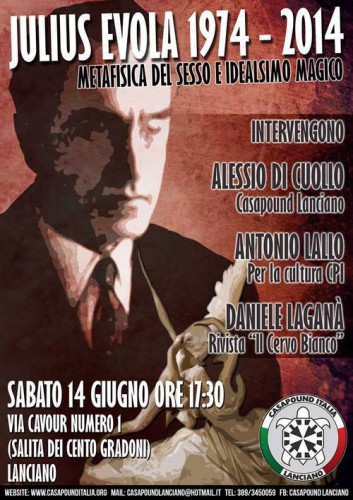
 But the irony is that 300 to 400 years ago, most civilized structures on Earth were based on these ideas. Even the modern ones that replaced them are based upon the contravention of these sorts of ideas, which means that they realized they were real enough to rebel against in the first instance. It’s also true that even in the high point of modernity, post-modernity, hypermodern reality, all the phrases that are used, when a war occurs, when the planes go into the towers in New York, when the helicopter gunships stream over Arabian sands, you suddenly see a slippage in the liberal verities and in the materialism and in some of the ideas which are used to justify these sorts of things. Not much of a slippage, but you suddenly see a slippage, what occultists and mystics call a “rending of the veil,” a ripping of the veil of illusion between life and death.
But the irony is that 300 to 400 years ago, most civilized structures on Earth were based on these ideas. Even the modern ones that replaced them are based upon the contravention of these sorts of ideas, which means that they realized they were real enough to rebel against in the first instance. It’s also true that even in the high point of modernity, post-modernity, hypermodern reality, all the phrases that are used, when a war occurs, when the planes go into the towers in New York, when the helicopter gunships stream over Arabian sands, you suddenly see a slippage in the liberal verities and in the materialism and in some of the ideas which are used to justify these sorts of things. Not much of a slippage, but you suddenly see a slippage, what occultists and mystics call a “rending of the veil,” a ripping of the veil of illusion between life and death.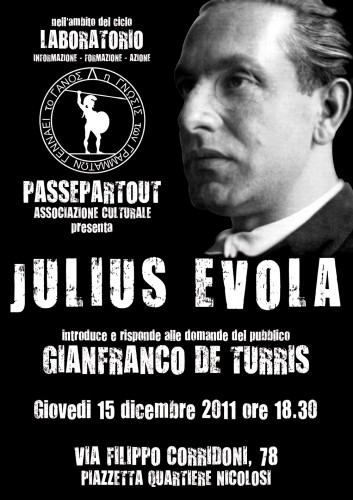 What is the worst thing in the world at the present time according to Sky News? Probably discrimination. Discrimination of one sort or another. Evola would believe that discrimination is the taxonomy of an aristocratic sensibility. One reaches for a piece of cake, one discriminates. One has an arranged marriage with another member of the Sicilian nobility, one discriminates. One reaches for a sword to do down a bounder that one wishes to beat with the flat of the blade, one discriminates between the weapon and the object of the rage, which is itself indifferent because it sees something beyond even itself. These are views, of course, that the majority of people will find cold, chilling, brutal, [unintelligible] beyond their conception. Almost forms of insanity in actual fact in relation to what is today regarded as normal or moral or even human. They are partly inhuman ideas, in some ways, but they are ideas that most aristocracies and most warrior castes have had for most forms of human history.
What is the worst thing in the world at the present time according to Sky News? Probably discrimination. Discrimination of one sort or another. Evola would believe that discrimination is the taxonomy of an aristocratic sensibility. One reaches for a piece of cake, one discriminates. One has an arranged marriage with another member of the Sicilian nobility, one discriminates. One reaches for a sword to do down a bounder that one wishes to beat with the flat of the blade, one discriminates between the weapon and the object of the rage, which is itself indifferent because it sees something beyond even itself. These are views, of course, that the majority of people will find cold, chilling, brutal, [unintelligible] beyond their conception. Almost forms of insanity in actual fact in relation to what is today regarded as normal or moral or even human. They are partly inhuman ideas, in some ways, but they are ideas that most aristocracies and most warrior castes have had for most forms of human history.
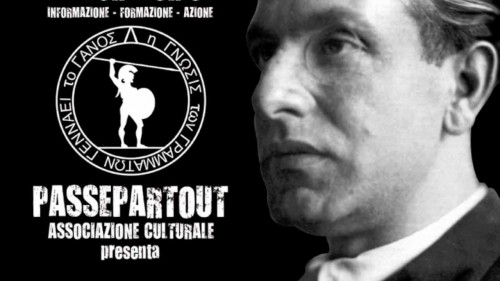


 El concepto de anarquismo derechista parece paradójico, de hecho, oximorónico, partiendo desde la suposición de que todos los puntos de vista políticos “derechistas” incluyen una evaluación particularmente alta del principio de orden… En efecto, el anarquismo de derecha ocurre sólo en circunstancias excepcionales, cuando la hasta ahora velada afinidad entre el anarquismo y el conservadurismo puede hacerse aparente.
El concepto de anarquismo derechista parece paradójico, de hecho, oximorónico, partiendo desde la suposición de que todos los puntos de vista políticos “derechistas” incluyen una evaluación particularmente alta del principio de orden… En efecto, el anarquismo de derecha ocurre sólo en circunstancias excepcionales, cuando la hasta ahora velada afinidad entre el anarquismo y el conservadurismo puede hacerse aparente.  El rechazo de las jerarquías éticas actuales, la preparación para ser “no apto, en el sentido más profundo de la palabra, para vivir” (Flaubert), revelan puntos comunes de referencia del dandy con el anarquismo; su estudiada frialdad emocional, su orgullo y su aprecio por la sastrería fina y los modales, así como la pretensión de constituir “un nuevo tipo de aristocracia” (Charles Baudelaire), representan la proximidad del dandy a la derecha política. A esto se suma la tendencia de los dandies políticamente inclinados a declarar simpatía a la Revolución Conservadora o a sus precursores, como por ejemplo Maurice Barrès en Francia, Gabriele d’Annunzio en Italia, Stefan George o Arthur Möller van den Bruck en Alemania. El autor japonés Yukio Mishima pertenece a los seguidores tardíos de esta tendencia.
El rechazo de las jerarquías éticas actuales, la preparación para ser “no apto, en el sentido más profundo de la palabra, para vivir” (Flaubert), revelan puntos comunes de referencia del dandy con el anarquismo; su estudiada frialdad emocional, su orgullo y su aprecio por la sastrería fina y los modales, así como la pretensión de constituir “un nuevo tipo de aristocracia” (Charles Baudelaire), representan la proximidad del dandy a la derecha política. A esto se suma la tendencia de los dandies políticamente inclinados a declarar simpatía a la Revolución Conservadora o a sus precursores, como por ejemplo Maurice Barrès en Francia, Gabriele d’Annunzio en Italia, Stefan George o Arthur Möller van den Bruck en Alemania. El autor japonés Yukio Mishima pertenece a los seguidores tardíos de esta tendencia.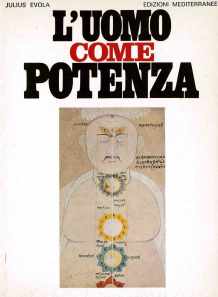
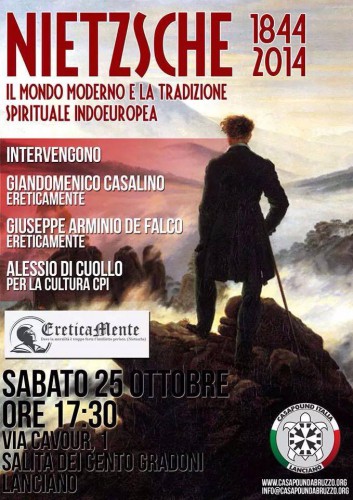
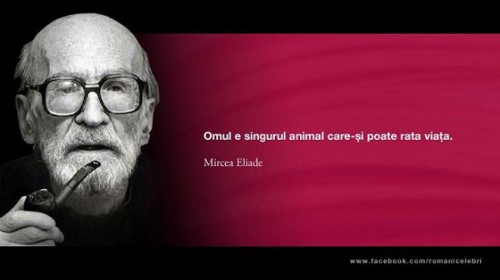

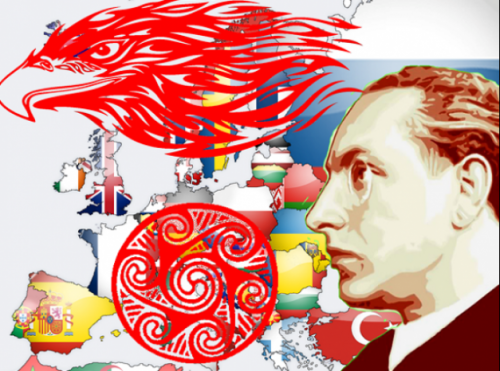

 In the days when I used to post on white nationalist websites one of the most recurring themes that people would argue about is the declining levels of Aryans vis a vis other races. I argued then as I argue now ratios are not relevant. Lower animals and races of men will breed at a faster rate than higher species or races. Often the reason for this is the higher mortality rate in such species and races. This fact may also be observed amongst the soci-economic classes which are a bastardised and commercialised version of the ancient traditional Aryan caste system (the two are not to be confused or even compared!). Individuals of lesser education (not merely formal education but general awareness and ability) tend to breed without restraint and with no consideration as to whether they (or the tax payer) can afford such indiscriminate coupling!
In the days when I used to post on white nationalist websites one of the most recurring themes that people would argue about is the declining levels of Aryans vis a vis other races. I argued then as I argue now ratios are not relevant. Lower animals and races of men will breed at a faster rate than higher species or races. Often the reason for this is the higher mortality rate in such species and races. This fact may also be observed amongst the soci-economic classes which are a bastardised and commercialised version of the ancient traditional Aryan caste system (the two are not to be confused or even compared!). Individuals of lesser education (not merely formal education but general awareness and ability) tend to breed without restraint and with no consideration as to whether they (or the tax payer) can afford such indiscriminate coupling!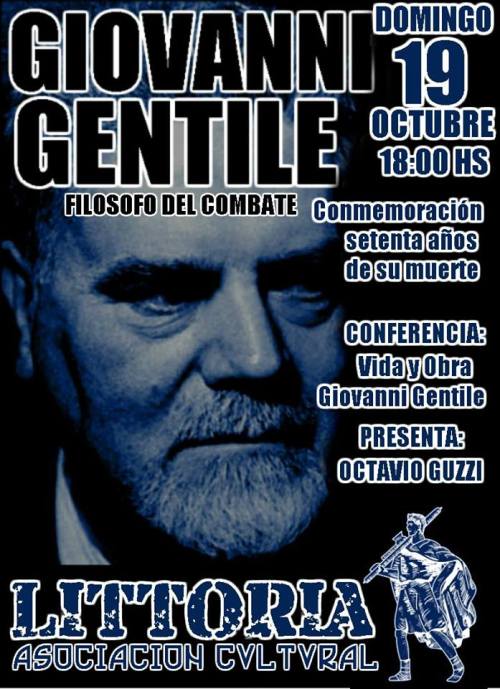
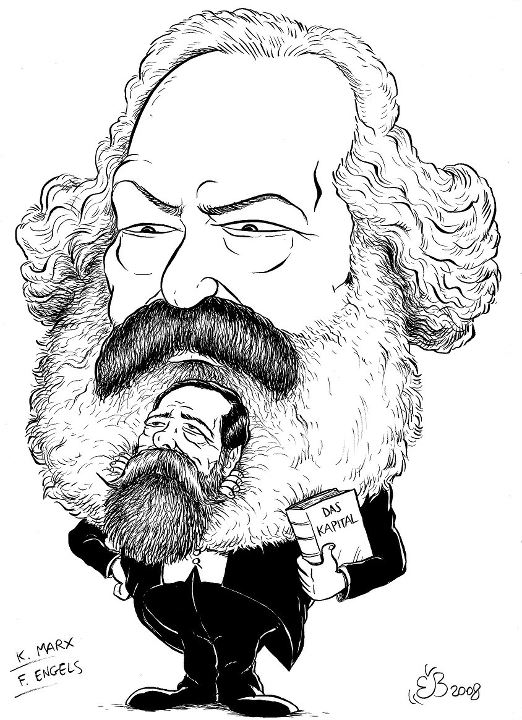
![Cara_Papini[1].jpg](http://euro-synergies.hautetfort.com/media/00/02/4099177256.jpg)
 Papini ci mostra un Gog sempre più mosso da umana pietà, che addirittura si commuove e si spaventa, mentre l’umanità pare sempre più demoniaca e priva di senno. Se nel primo romanzo Gog pareva schernire l’umanità, ora pare invece averne pena. Sempre schivo, diffidente e riservato, questo magnate giramondo, spettatore attonito delle vicende umane, non prende mai parte a nessuno dei progetti che nuovamente gli vengono proposti dagli uomini che incontra, folli o straordinari che siano. Il massimo che gli riesce di fare è finanziare, o semplicemente dare promessa di tale intento, a qualche inventore o rivoluzionario in cerca di contributi economici per portare a termine il proprio progetto innovativo. Il romanzo si apre, non per niente, con l’incontro con Ernest O. Lawrence, fisico e Premio Nobel per essere stato l’inventore e il perfezionatore del ciclotrone, il primo acceleratore circolare di particelle atomiche. L’era atomica è quella profetizzata da Papini, e la paura di una guerra nucleare il nuovo spettro che si aggira per il mondo. Ma la profezia più grande contenuta nel romanzo è quella che il nostro Gog/Papini riceve da Lin Youtang – il capitolo è infatti intitolato “Visita a Lin Youtang (o del pericolo giallo)”- di cui vale la pena riportare qualche passaggio:
Papini ci mostra un Gog sempre più mosso da umana pietà, che addirittura si commuove e si spaventa, mentre l’umanità pare sempre più demoniaca e priva di senno. Se nel primo romanzo Gog pareva schernire l’umanità, ora pare invece averne pena. Sempre schivo, diffidente e riservato, questo magnate giramondo, spettatore attonito delle vicende umane, non prende mai parte a nessuno dei progetti che nuovamente gli vengono proposti dagli uomini che incontra, folli o straordinari che siano. Il massimo che gli riesce di fare è finanziare, o semplicemente dare promessa di tale intento, a qualche inventore o rivoluzionario in cerca di contributi economici per portare a termine il proprio progetto innovativo. Il romanzo si apre, non per niente, con l’incontro con Ernest O. Lawrence, fisico e Premio Nobel per essere stato l’inventore e il perfezionatore del ciclotrone, il primo acceleratore circolare di particelle atomiche. L’era atomica è quella profetizzata da Papini, e la paura di una guerra nucleare il nuovo spettro che si aggira per il mondo. Ma la profezia più grande contenuta nel romanzo è quella che il nostro Gog/Papini riceve da Lin Youtang – il capitolo è infatti intitolato “Visita a Lin Youtang (o del pericolo giallo)”- di cui vale la pena riportare qualche passaggio:
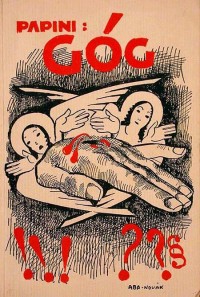 Papini fu giornalista, scrittore, filosofo, poeta, aforista, animatore culturale e agitatore politico, come molti toscani dell’epoca. Fu nazionalista, futurista, filo-fascista, ateo e anticlericale, per poi convertirsi alla religione cattolica. Passò da Nietzsche a Gesù, percorso che si può riassumere nelle rispettive e simboliche opere “Un uomo finito” del 1913 e “Storia di Cristo” del 1921. Ed è forse proprio nella sua riscoperta spirituale, nella sua conversione cattolica, che si può spiegare il suo antisemitismo, probabile percorso nel solco di una certa tradizione cristiana che vede negli ebrei gli assassini di Cristo.
Papini fu giornalista, scrittore, filosofo, poeta, aforista, animatore culturale e agitatore politico, come molti toscani dell’epoca. Fu nazionalista, futurista, filo-fascista, ateo e anticlericale, per poi convertirsi alla religione cattolica. Passò da Nietzsche a Gesù, percorso che si può riassumere nelle rispettive e simboliche opere “Un uomo finito” del 1913 e “Storia di Cristo” del 1921. Ed è forse proprio nella sua riscoperta spirituale, nella sua conversione cattolica, che si può spiegare il suo antisemitismo, probabile percorso nel solco di una certa tradizione cristiana che vede negli ebrei gli assassini di Cristo.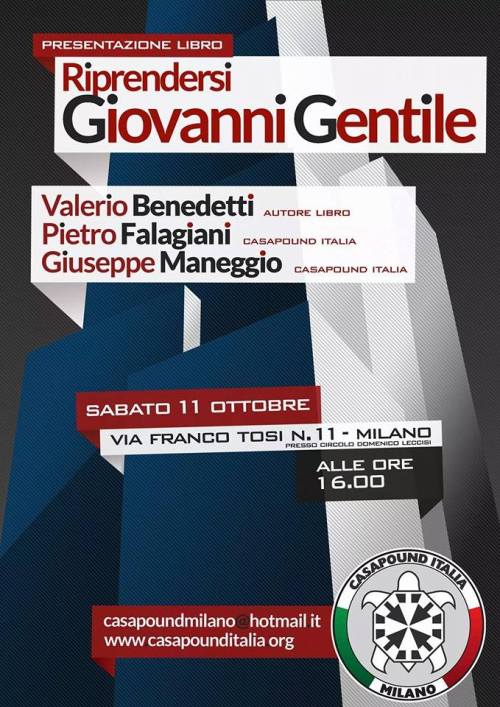
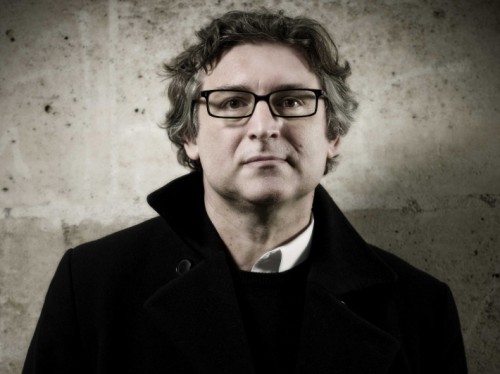



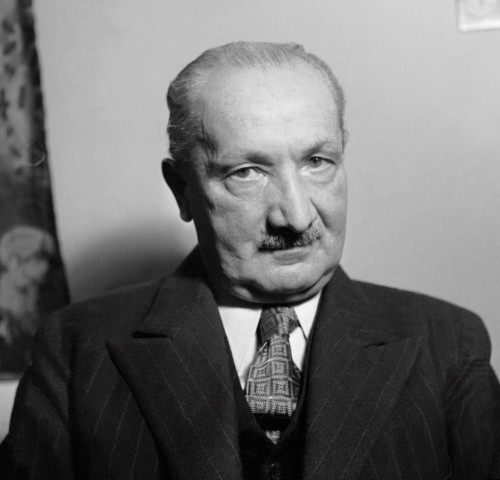

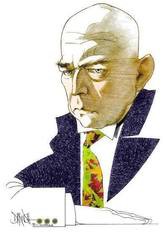 L'opera che più di tutte accompagnò la prima guerra mondiale e che dette il nome alla letteratura della crisi che poi ne seguì, in realtà fu scritta prima del conflitto. Era infatti il 1914, giusto cent'anni fa, quando Oswald Spengler concluse Il tramonto dell'Occidente; poi quel titolo divenne l'epigrafe del dopoguerra e il suo compendio, almeno mitteleuropeo. L'opera vide la luce sul finire della prima guerra mondiale e fu un trionfo di vendite e commenti. Uscì in ritardo per via della guerra, e questo permise a Spengler di rielaborare alcune pagine e aggiungere nuovi particolari. Tuttavia era stata scritta e pensata non alla luce della guerra e del suo esito, ma prima, in uno sguardo epocale alle civiltà del passato e del presente. Per l'avvenire Spengler prevedeva lo scontro finale fra la dittatura del denaro e la civiltà del sangue, del lavoro e del socialismo. Alla fine, vaticinava, la spada trionferà sul denaro perché una potenza può essere rovesciata solo da una potenza.
L'opera che più di tutte accompagnò la prima guerra mondiale e che dette il nome alla letteratura della crisi che poi ne seguì, in realtà fu scritta prima del conflitto. Era infatti il 1914, giusto cent'anni fa, quando Oswald Spengler concluse Il tramonto dell'Occidente; poi quel titolo divenne l'epigrafe del dopoguerra e il suo compendio, almeno mitteleuropeo. L'opera vide la luce sul finire della prima guerra mondiale e fu un trionfo di vendite e commenti. Uscì in ritardo per via della guerra, e questo permise a Spengler di rielaborare alcune pagine e aggiungere nuovi particolari. Tuttavia era stata scritta e pensata non alla luce della guerra e del suo esito, ma prima, in uno sguardo epocale alle civiltà del passato e del presente. Per l'avvenire Spengler prevedeva lo scontro finale fra la dittatura del denaro e la civiltà del sangue, del lavoro e del socialismo. Alla fine, vaticinava, la spada trionferà sul denaro perché una potenza può essere rovesciata solo da una potenza.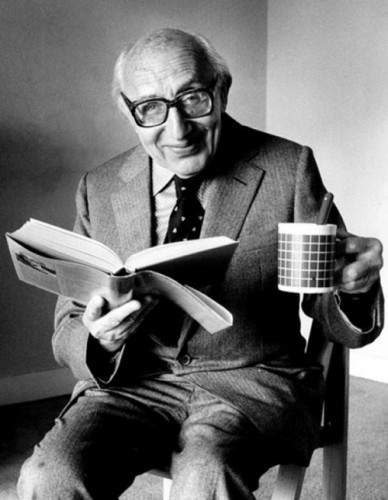
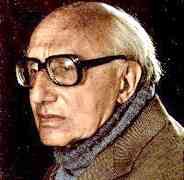 Norbert Elias ( 1897, Alemania -1990, Holanda) sociólogo judío-alemán cuyo trabajo se concentró en la relación entre poder, comportamiento, emoción y conocimiento.
Norbert Elias ( 1897, Alemania -1990, Holanda) sociólogo judío-alemán cuyo trabajo se concentró en la relación entre poder, comportamiento, emoción y conocimiento.  En El proceso de civilización Elias parte de un problema presente, la orgullosa autoconciencia que tienen los occidentales de ser “civilizados”, para demostrar que las formas de comportamiento sociales y políticas consideradas típicas del hombre “civilizado” occidental no han sido siempre iguales, sino que son fruto de un complejo proceso histórico en el que interactúan factores de diversa índole que dan lugar a transformaciones en las estructuras sociales y políticas (sociogénesis), y también en la estructura psíquica y del comportamiento de los individuos (psicogénesis), es decir, que a lo largo de muchos siglos se va produciendo una transformación paulatina hasta alcanzar la pauta de nuestro comportamiento actual, lo cual no quiere decir que el proceso civilizador haya culminado. Para Elias no tiene un principio específico y continúa en marcha, ni siquiera lo identifica con la idea de progreso señalando que no hay nada intrínsecamente bueno o malo en la civilización. Por otro lado tampoco lo considera como un proceso rectilíneo sino que más bien implica flujos y reflujos, movimientos hacia atrás y hacia delante, incluso desplazamientos laterales.
En El proceso de civilización Elias parte de un problema presente, la orgullosa autoconciencia que tienen los occidentales de ser “civilizados”, para demostrar que las formas de comportamiento sociales y políticas consideradas típicas del hombre “civilizado” occidental no han sido siempre iguales, sino que son fruto de un complejo proceso histórico en el que interactúan factores de diversa índole que dan lugar a transformaciones en las estructuras sociales y políticas (sociogénesis), y también en la estructura psíquica y del comportamiento de los individuos (psicogénesis), es decir, que a lo largo de muchos siglos se va produciendo una transformación paulatina hasta alcanzar la pauta de nuestro comportamiento actual, lo cual no quiere decir que el proceso civilizador haya culminado. Para Elias no tiene un principio específico y continúa en marcha, ni siquiera lo identifica con la idea de progreso señalando que no hay nada intrínsecamente bueno o malo en la civilización. Por otro lado tampoco lo considera como un proceso rectilíneo sino que más bien implica flujos y reflujos, movimientos hacia atrás y hacia delante, incluso desplazamientos laterales.  Elias demuestra, al margen de si era necesario o una obviedad, que “los hombres de Occidente no se han comportado siempre del modo que hoy acostumbramos a considerar como…propio de hombre “civilizados”. Si uno de nuestros contemporáneos occidentales civilizados regresara…por ejemplo al periodo feudal-medieval, en contraría en él mucho de lo que está acostumbrado a considerar como “incivilizado” en otras sociedades. (Elias, 1987; 47)
Elias demuestra, al margen de si era necesario o una obviedad, que “los hombres de Occidente no se han comportado siempre del modo que hoy acostumbramos a considerar como…propio de hombre “civilizados”. Si uno de nuestros contemporáneos occidentales civilizados regresara…por ejemplo al periodo feudal-medieval, en contraría en él mucho de lo que está acostumbrado a considerar como “incivilizado” en otras sociedades. (Elias, 1987; 47)  Erasmo escribe, se supone al menos, en sus Colloquio, a los niños, y no les oculta la prostitución ni las casas donde se ejerce. Se avisa de su peligro pero no se oculta pudorosamente. Sus inquilinas eran un sector marginado, desde luego, pero más aceptado y con un rol social previsto y reconocido en la ciudad medieval de fines de la Edad Media. Los hijos ilegítimos tenían un reconocimiento en pasados siglos que fueron perdiendo gradualmente (Elias, 1987; 222). Aunque el grado de tolerancia cambie, la visión de al relación extramarital permanece siempre más benevolente para el marido que para la mujer.
Erasmo escribe, se supone al menos, en sus Colloquio, a los niños, y no les oculta la prostitución ni las casas donde se ejerce. Se avisa de su peligro pero no se oculta pudorosamente. Sus inquilinas eran un sector marginado, desde luego, pero más aceptado y con un rol social previsto y reconocido en la ciudad medieval de fines de la Edad Media. Los hijos ilegítimos tenían un reconocimiento en pasados siglos que fueron perdiendo gradualmente (Elias, 1987; 222). Aunque el grado de tolerancia cambie, la visión de al relación extramarital permanece siempre más benevolente para el marido que para la mujer.  Cadenas de interdependencia; un concepto clave en la obra de Elias. Suponen la dependencia de los individuos entre sí a medida que avanzan una serie de interrelaciones a las que contribuyen entre otras causas el aumento demográfico, el desarrollo urbano, la especialización o división de funciones, el cambio de una economía natural a la monetaria o la centralización de los poderes públicos. Las cadenas de interdependencia se interrelacionan de tal forma que afectan a todos los ámbitos de las manifestaciones humanas, determinando la marcha del proceso histórico, y son el fundamento del proceso civilizador en una dirección determinada.
Cadenas de interdependencia; un concepto clave en la obra de Elias. Suponen la dependencia de los individuos entre sí a medida que avanzan una serie de interrelaciones a las que contribuyen entre otras causas el aumento demográfico, el desarrollo urbano, la especialización o división de funciones, el cambio de una economía natural a la monetaria o la centralización de los poderes públicos. Las cadenas de interdependencia se interrelacionan de tal forma que afectan a todos los ámbitos de las manifestaciones humanas, determinando la marcha del proceso histórico, y son el fundamento del proceso civilizador en una dirección determinada.